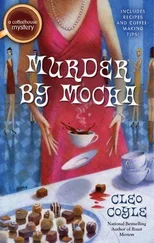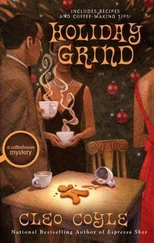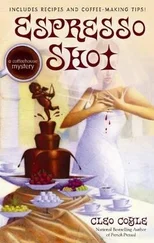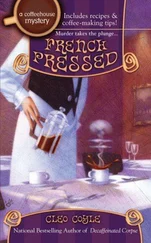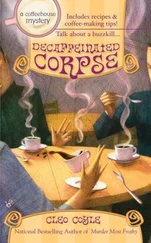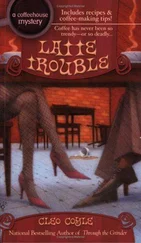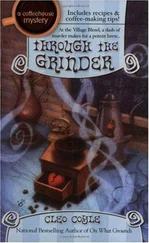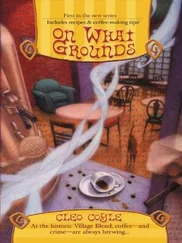Tucker raised an eyebrow. “Speaking from experience, are we?”
“No comment.”
“You know what my favorite was?” Barry said. “The one with Smokey the Bear. Now how did that one go?”
“ ‘Only you can prevent wildfires,’ ” Tucker said.
If only, I thought with a sigh.
“You know what my all-time favorite PSA is?” Esther asked.
Tucker folded his arms. “Do I know or do I care?”
“It’s that one where some dude cracks an egg into a sizzling hot pan, and says,‘This is your brain on drugs.’”
“I remember that one!” Barry said. “The egg’s a visual metaphor. Like when you’re fried .”
I also recalled that PSA, but a half-assed omelet didn’t even begin to cover the extent of the nightmares I’d dealt with when my ex-husband’s gray matter had been on cocaine.
Tucker finished pulling my shot and handed it over.
Generally speaking, espresso became more temperamental as the day wore on. The reason (in geek-speak) was the coffee’s tendency to be hygroscopic , which basically meant that it readily sopped up surrounding air moisture, or in cases of excessively dry conditions, released it. So, in the morning, with lower temperatures and higher humidity, the extractions were magnificently thick and slow — not unlike the start of Mike’s lovemaking last night. But as the sun came up and the air dried out, the extractions tended to run fast...
Boy did that analogy give me pause.
Tucker’s test extraction for me looked pretty darn good. The viscosity was there, the color a deep reddish brown. But as I looked closer, I noticed a marked lack of tiger mottle — the deep brown flecking in a truly great pull.
I sipped.
Tuck fell silent, met my eyes. “What’s wrong?”
“There’s a slight hint of bitterness...”
“I didn’t taste it.”
“It’s there.”
Tucker sighed. “The humidity again?”
“I’m not sure...” I checked the machine’s gauges.
Esther came around the counter. “ This I want to hear.”
“It can’t be the humidity!” Tucker protested. “I already went to a finer grind.”
“You did?” That surprised me. I turned to Esther. “You better get me the Glass.”
Esther showed her palms to the tin ceiling and pumped her arms in a victorious hip-hop club gesture she once told me meant raise the roof . “I told you, I told you, now the Best Girl she’ll scold you!”
“Oh, don’t be a ninny!”
As a gleeful Esther rushed into the back pantry to get the infamous Glass, I grabbed a paper towel, put it under the doser, and ran the grinder. A pile of fine black sand now sat on the flat white background like a negative satellite photo of K2.
“Here you go-oh !” Esther sang, setting a Holmes-worthy magnifying glass next to my grind sample. She tossed a smirk at Tucker. “I told you so-oh !”
“Tucker’s right,” I said.
“About what?”
“You’re being a ninny.”
“I am not!”
“Silenzio!” I picked up The Glass. Tucker and Esther flanked me, wordlessly watching as I spread out the grounds and closely examined them.
“There it is. You see?” I motioned them closer. “Evidence of irregular lumps.”
“Not again!” Tucker cried.
“Yes, again,” I said.
Coffee properly ground in a burr grinder displayed uniform particles with beautiful lattice networks (at the microscopic level), which properly maximized the area of coffee exposed during the intense espresso extraction process. But the uneven grains I was now studying had clumpish, oafish shapes. They were almost as horrific as what a cheap blade grinder would produce.
(Every so often I’d encounter a customer who regularly paid a higher price for our premium coffee beans but balked at investing in a decent burr grinder. Inexpensive blade grinders were fine for chopping spices, I’d always explain, but far too violent for chopping coffee beans. When those suckers started whirring at 20,000 to 30,000 RPMs, they produced enough frictional heat to scorch the beans they were grinding, which was why the coffee ended up tasting bitter. Blade chopping also produced uneven grains, a disaster for getting consistent quality.)
The final coffee might be drinkable, but it was far from achieving its potential. A sad thought because I knew just how much blood, sweat, and tireless tasting went into cultivating, picking, sorting, processing, sourcing, shipping, and finally roasting our premium beans.
My present problem, however, wasn’t with the freshness of our roast, the skill of our baristas, or the quality of our appliances. Like any other serious espresso bar, we used a conical burr grinder. The issue today was maintenance.
“Our baby’s blades have gone slightly dull from overuse.” I didn’t actually need to state this. Tucker had been through this many times before.
“Another teachable moment.” Esther smirked at Tucker. “I told you it wasn’t the weather.”
“Don’t rub it in. It’s bad form.”
“I’m just being honest, PSA Boy. You of all people should know the motto I live by.”
“Huh?”
“If you see something, say something!”
Tucker’s eyes narrowed. “Listen, Clare, I have an idea. Why don’t I give the Duchess of High Dudgeon her very own teachable moment, like how to change the blades. Then she can start sharing in the fun.”
“Good idea,” I said.
“But, boss — ” Behind her black-framed glasses, Esther’s big brown eyes turned pleading. “My friends are here! And I don’t really care about learning how to — ”
“Good idea,” I repeated, cutting her off. “I’ll take over the bar. You two take the machine to the worktable downstairs.”
We had a backup grinder for situations like this one. I pulled it out as Tucker unplugged the problem appliance. Then off he went, a pouting Esther in tow.
When I glanced up, I found Barry watching all this with a cross between curiosity and amusement. “Wow. I didn’t realize so much scientific rigor went into making my latte.”
“You have no idea.”
I’d once explained it all to Mike, or tried to. When things went wrong in making espresso, any number of variables could be the offending agent — a good barista had to go through each variable , eliminating suspects one by one, until the true offender was found.
Mike replied with one sentence: “Sounds like my job.”
I smiled at Barry. “Would you like another latte?”
“Yes, please! You have the best in the city.”
“In that case,” I told him, “this one’s on the house.”
Twenty minutes later, Barry was gone, and Tucker and Esther had returned to the espresso bar to help with a brief flurry of prelunch rush customers. I was just finishing the pour on my last order in line — a Hazelnut-Caramel Latte, which I topped with the flourish of a heart-crowned rosetta — when I heard a familiar door slam. Don’t ask how I can recognize one particular man by his door slam. I just can.
A minute later, our shop’s front bell was ringing and so were my eardrums.
“Clare!”
The customers in my half-filled shop came alert at their tables.
“What the hell is going on with my mother!”
My ex-husband had arrived.
Matt dropped his suitcase (loudly) next to a barstool while simultaneously sliding a heavy backpack off his Nautilus-sculpted shoulders. It hit the ground with an equally subtle thud.
“I touched down at JFK an hour ago, after a truly horrendous red-eye out of Charles de Gaulle, and what do I see when I pass the first newsstand?” Matt threw a folded-up Post down on the bar. “A front-page photo of my mother being hoisted into an ambulance by a passel of firemen with my ex-wife looking on!” He glared. “What happened, Clare?”
Читать дальше



